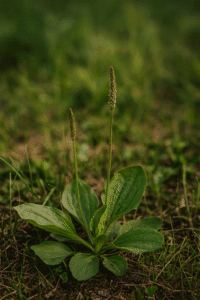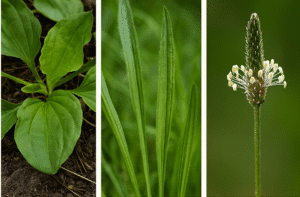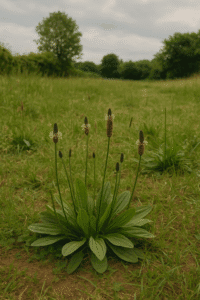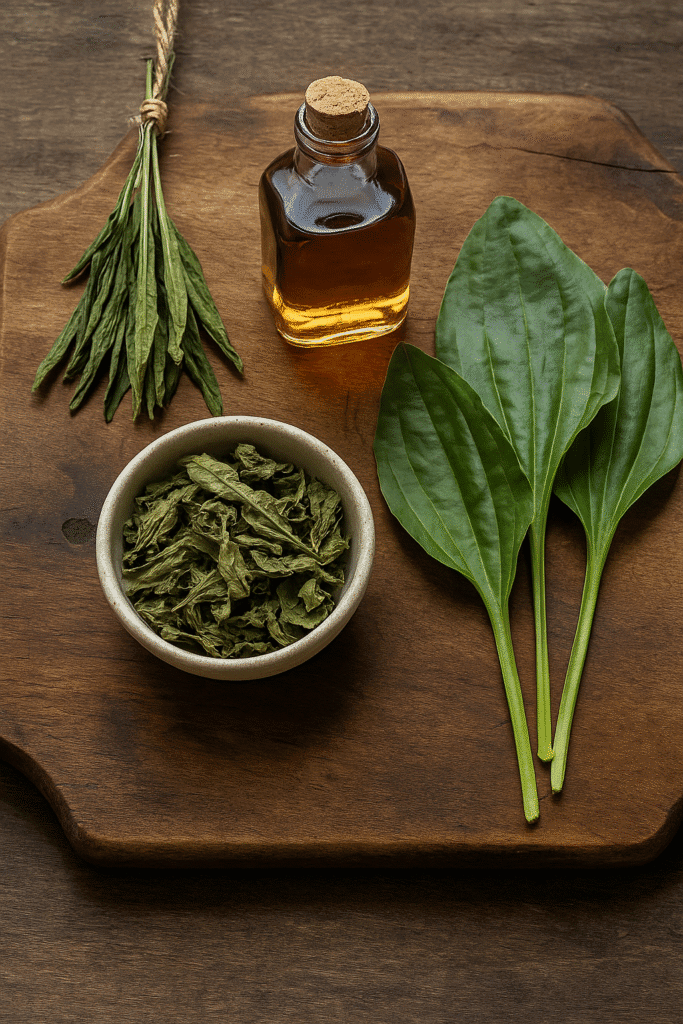
1. Introduction
Plantain (Plantago major & Plantago lanceolata) is one of the most common and powerful “weeds” you’ll encounter. While often overlooked, its leaves are a natural first-aid kit – soothing stings, bites, and wounds – and it’s also edible and nutritious.
2. How to Identify Them

🌿 Leaves:
Plantago major: Broad, oval leaves in a low rosette, with 5–9 parallel veins.
Plantago lanceolata: Narrow, lance-shaped leaves with 3–7 veins.
🌸 Flowers: Small, greenish-brown spikes with tiny white stamens.
🌱 Growth: Low to the ground, often forming mats along paths, lawns, and roadsides.
3. When to Harvest
- Best time: Spring through autumn (young leaves are most tender).
- Pick fresh, green leaves (avoid yellowed or old ones)
- Flower spikes can be collected in late spring/early summer.
4. Where to Find Them

Plantain thrives in:
Lawns, gardens, and footpaths
Roadsides and meadows
Disturbed or compacted soils
🌞 Loves sunny spots but also grows well in partial shade.
5. Foraging Safety 🚫
Avoid areas near busy roads or sprayed lawns.
Wash thoroughly before eating fresh.
Harvest sustainably → leave plenty for pollinators and wildlife.
6. Health Benefits 🍃
Anti-inflammatory → soothes insect bites, nettle stings & minor cuts.
Rich in vitamins A, C, and K.
Traditionally used as a respiratory aid (tea for coughs & colds).
Seeds (psyllium husk from related species) aid digestion.
7. Delicious Plantain Recipes 🍴
🥗 Wild Green Salad
Mix young leaves with dandelion, chickweed, and a light vinaigrette.
🍵 Plantain Tea
Steep fresh or dried leaves in hot water → soothing for coughs & sore throats.
🥘 Crispy Plantain Chips
Coat whole leaves with olive oil & salt, bake until crisp.
💚 Plantain Poultice (remedy)
Crush a fresh leaf and apply directly to insect stings or small wounds.
8. Storage Tips

Fresh: Use within 1–2 days (wilts quickly).
Drying: Hang or dehydrate leaves for tea and remedies.
Tincture: Preserve medicinal properties in alcohol for long-term use.
9. Folklore & Symbolism ✨
🌙 In Celtic tradition, plantain was seen as a protector for travelers, guarding against fatigue and accidents.
✨ Known as a “healing herb of nine powers” in Anglo-Saxon herbal lore.
💚 Symbol of resilience – thriving where others cannot.
